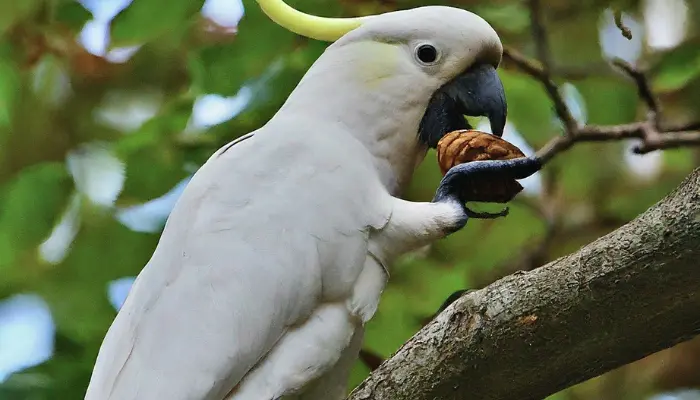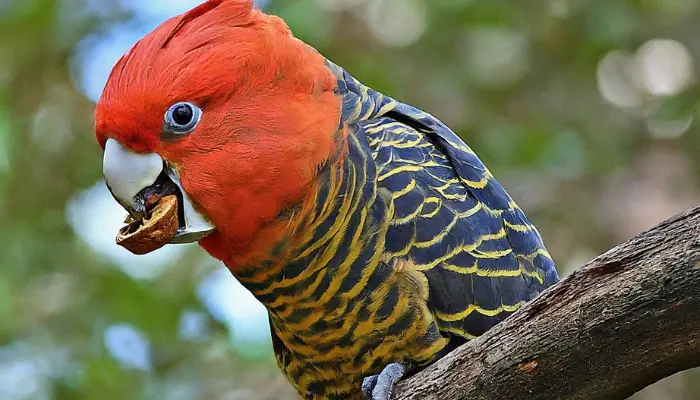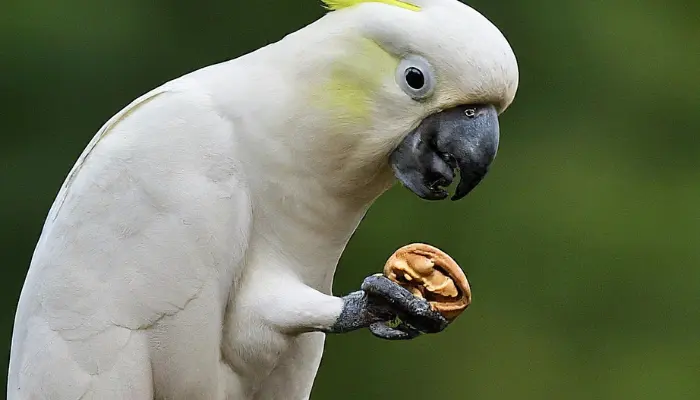Cockatoos are beloved pets for bird enthusiasts worldwide and are known for their striking plumage and intelligent behavior. As with any pet, ensuring they receive a balanced and safe diet is crucial to their health and well-being.
One common question among cockatoo owners is whether these vibrant birds can safely eat walnuts. This article delves into the dietary habits of cockatoos, exploring the nutritional benefits and potential risks of feeding them walnuts, and guides how to incorporate this nut into their diet responsibly.
Can Cockatoos Eat Walnuts?
Cockatoos can eat walnuts but it is important to offer them in moderation as part of a balanced diet. Walnuts are a good source of healthy fats, protein, and essential nutrients like vitamins and minerals. They are also high in fats and can be calorie-dense, so too many may lead to weight gain or digestive issues for cockatoos.
It is best to offer walnuts as an occasional treat rather than a staple food item, alongside a variety of other fruits, vegetables, and seeds to ensure a well-rounded diet for these intelligent and social birds. Additionally, always make sure the walnuts are unsalted and free from any additives or preservatives as these can be harmful to cockatoos’ health.

Nutritional Profile of Walnuts
Here is a more accurate nutritional profile for walnuts based on a typical serving size of 1 ounce (about 28 grams).
| Nutrient | Serving Size of 1 Ounce (about 28 grams) |
|---|---|
| Calories | 185 |
| Total Fat | 18.5g |
| Total Carbohydrate | 3.9g |
| Dietary Fiber | 1.9g |
| Sugars | 0.7g |
| Protein | 4.3g |
| Potassium | 125mg |
| Magnesium | 45mg |
| Vitamin E | 1.9mg |
This profile showcases the nutrients found in walnuts including healthy fats, protein, fiber, vitamins, and minerals, which contribute to their numerous health benefits.
Nutritional Benefits of Walnuts for Cockatoos
Walnuts can be a nutritious addition to a cockatoo’s diet when given in moderation. They are rich in healthy fats, protein, fiber, vitamins, and minerals, which can contribute to your cockatoo’s overall health. Here are some of the nutritional benefits of walnuts for cockatoos.
- Healthy Fats: Walnuts contain omega-3 and omega-6 fatty acids, which are essential for maintaining your cockatoo’s skin, feathers, and overall health. These fats also support brain function and immune system health.
- Protein: Walnuts provide a source of plant-based protein, which is important for muscle development, tissue repair, and overall growth in cockatoos.
- Fiber: The fiber content in walnuts can aid in digestion and promote gastrointestinal health in cockatoos, helping to prevent issues like constipation.
- Vitamins: Walnuts contain various vitamins, including vitamin E, which acts as an antioxidant and supports immune function, and B vitamins, which are essential for energy metabolism and overall health.
- Minerals: Walnuts are a good source of minerals such as magnesium, phosphorus, and potassium, which play vital roles in bone health, muscle function, and overall metabolic processes in cockatoos.
Make sure to offer walnuts as part of a balanced diet that includes a variety of fruits, vegetables, seeds, and pellets specifically formulated for cockatoos to ensure they receive all the nutrients they need. Always consult with a avian veterinarian or avian nutritionist for specific dietary recommendations for your cockatoo.

Potential Health Risks of Walnuts for Cockatoos
Feeding walnuts to cockatoos can pose potential health risks if not done properly. While walnuts are a nutritious food for humans but they may not be suitable for birds like cockatoos due to several reasons.
- High Fat Content: Walnuts are high in fat, which can be problematic for cockatoos as they have sensitive digestive systems. Consuming too much fat can lead to obesity, liver problems, and other health issues in birds.
- Risk of Mold: Walnuts, like many nuts, can develop mold if not stored properly. Moldy nuts can contain toxins that are harmful to birds if ingested, leading to illness or even death.
- Choking Hazard: Whole walnuts or large pieces of walnuts can pose a choking hazard to cockatoos, especially if they try to swallow them whole.
- Nutrient Imbalance: While walnuts contain some beneficial nutrients, they may not provide a well-balanced diet for cockatoos. Cockatoos require a variety of nutrients to stay healthy, and relying too heavily on walnuts can lead to deficiencies in other essential nutrients.
- Allergic Reactions: Some cockatoos may be allergic to walnuts, experiencing adverse reactions such as itching, swelling, or respiratory problems.
If you want to offer walnuts to your cockatoo as an occasional treat, it is crucial to do so in moderation and always ensure they are fresh, unsalted, and free from any signs of mold.
Conclusion
Walnuts have good stuff like healthy fats, protein, and vitamins, which are great for birds. But because they’re high in fat, can get moldy, and might cause choking, it’s best to offer them sparingly. Make sure to balance their diet with fruits, veggies, seeds, and pellets made for cockatoos.
